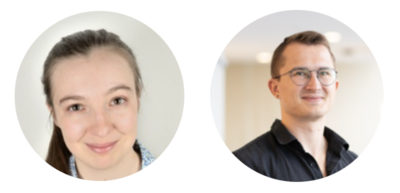
OpenDP Visiting Fellows are part-time positions meant for engineers or scholars in industry or academia who wish to learn about, contribute, and engage with OpenDP. To learn more about the program and apply for the next round, click here!
For 2023, we have two Fellows - Pauline Maury-Laribiere and Liudas Panavas. Get to know them and the projects they're working on below!
Pauline Maury-Laribiere
Q: Tell us a little about yourself
I am currently a Data Scientist at the Federal Statistical Office of Switzerland. In my previous roles, I worked as a Machine Learning Engineer in start-ups. My background is in Microengineering with a special focus on Robotics from Ecole Polytechnique Fédérale de Lausanne (EPFL). In my free time, I like to climb, do outdoor activities in general and read.
Q: What are you currently working on?
Within the OpenDP Fellowship program, I am working on a project to publish statistics on income datasets with differential privacy. My primary focus is on developing functions that will enable the OpenDP Library to be used on dataframes with Polars. Furthermore, I am researching methods to improve the accuracy and privacy tradeoffs on datasets with extreme values by limiting the noise.
Q: What interested you in becoming an OpenDP Fellow?
I helped organise the 1st UN PET Lab Hackathon last year where I had the opportunity to discover and use the OpenDP Library, which was one of the libraries that the participants were allowed to use. The participants that used the library performed quite well, thus highlighting the efficiency of OpenDP as well as its flexibility in comparison with other libraries. However, current drawbacks consist of its steeper learning curve to start working with the library and that it does not enable tools for working with tabular data with Polars yet, which is the type of data most used in data science. For these reasons, I am particularly interested in helping to further develop the Polars functionalities in OpenDP.
Q: What are you hoping to achieve during your Fellowship?
Throughout my fellowship, I hope to develop the functions necessary to conduct a differentially private analysis of the Swiss Income dataset and showcase it in a notebook. This aims to promote the adoption of differential privacy in two ways: first, by showcasing a successful application on governmental data, and second, by simplifying the use of OpenDP by data scientists.
Liudas Panavas
Q: Tell us a little about yourself
I’m a PhD student focusing on data visualization and human computer interaction (HCI) at Northeastern University. My work is broad and really involves anything that catches my eye at that particular time. I’ve investigated children’s perception of graphs, comparison of computer vision models, gamification of surveys, and obviously differential privacy. Outside of work I enjoy reading fantasy books, playing sports, having a coffee, and flying to new cities.
Q: What are you currently working on?
My goal for the summer is to better understand how people learn differential privacy (DP). As a foundation for any project or any organization to adopt differential privacy, there has to be a base level of understanding. Since it’s a new topic and rather specialized, there isn’t a lot of formal education on the topic or informal materials. I’m curious what educational tools we can create and what are the most important aspects to be taught for someone to understand the value proposition of DP.
Q: What interested you in becoming an OpenDP Fellow?
Two reasons: First, I found the OpenDP slack channel and it seemed like there was a real community formed here around DP. Second, there is a major push for making DP more digestible by the OpenDP community. One thing I have struggled with in the literature is finding real understanding or answers on the HCI difficulties of using DP. By becoming an OpenDP Fellow, I wanted to gain access to a lot of people who were interested in talking about this problem.
Q: What are you hoping to achieve during your Fellowship?
My major goal is to jump start a project over the fall. I want to conduct the needfinding portion of my study by interviewing and chatting with individuals so that I can create tools not grounded just in literature but in practical application. I hope by the end of summer to complete the qualitative portion of my study and have design requirements for an educational visual tool.
